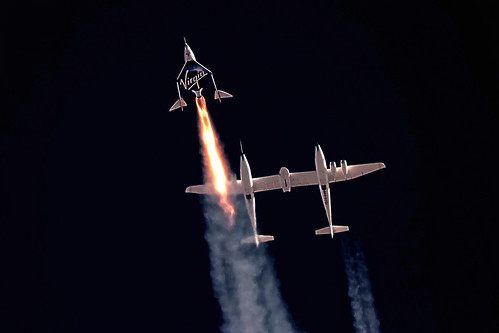
Pressing pause — For Virgin Galactic, becoming profitable means a pause in flying to space Virgin Galactic has just one more flight planned for its only operational spaceship.
Stephen Clark – Mar 1, 2024 12:26 am UTC Enlarge / Virgin Galactic’s VSS Unity rocket plane ignites its rocket motor moments after release from a jet-powered carrier aircraft high above New Mexico.Virgin Galactic reader comments 22
Last year, Virgin Galactic seemed to finally be hitting a stride toward making commercial suborbital spaceflight. The company flew its SpaceShipTwo rocket plane to the edge of space six times in six months, giving a few Virgin Galactic customers a taste of spaceflight after waiting more than a decade.
Finally, it appeared that Virgin Galactic turned a corner, moving past the setbacks and course corrections that delayed founder Sir Richard Branson’s aim of bringing spaceflight to a wider population. Virgin Galactic officials wouldn’t describe the company’s next step as a setback or a course correction. It’s part of an intentional business strategy to make Branson’s dream a reality.
“That dream behind Virgin Galactic came into sharp focus as we repeatedly flew spaceship Unity in 2023,” saidMichael Colglazier, Virgin Galactic’s president and CEO, in a quarterlyearnings call this week. “Now, in 2024, we’re poised for even more meaningful accomplishments as we build the fleet of spaceships that will turn the dream into reality and long-term success.”
But to do so, Virgin Galactic needs to give up on the horse that got them here.
On 11 missions, including test flights, theVSS Unity rocket plane has soared higher than 50 miles (80 kilometers)where space begins, according to the US government’s definitionbut it will probably fly just once more. Virgin Galactic is redirecting resources toward completing the development and testing of a new fleet of rocket planes known as Delta-class ships, which the company says will outclassVSS Unity in flight cadence, reusability, and revenue-earning potential. Advertisement
Colglazier said the first of Virgin Galactic’s Delta ships is on track to begin ground and flight testing next year, with commercial service targeted for 2026 based out of Spaceport America in New Mexico. One more and done
Late last year, Virgin Galactic announced it would retireVSS Unityby the middle of 2024, following the company’s Galactic 07 or Galactic 08 missions. On Tuesday, a company spokesperson confirmed to Ars that Virgin Galactic will pause flights ofVSS Unityafter the Galactic 07 mission slated for this spring. That means the rocket plane will fly to space just one more time, taking four customers into suborbital space to experience a few minutes of microgravity before coming back to land on a runway.
Colglazier said this next flight will have a “blended manifest of researchers and private citizens.” The company hasn’t identified any of the passengers, and for the last several flights, hasn’t announced the names of their passengers until after they landed.
Mike Moses, Virgin Galactic’s president of spaceline operations, said the Galactic 07 mission, the final flight of VSS Unity, is scheduled for the second quarter of this year, sometime between the beginning of April and the end of June. He said engineers are looking at a “minor change” to a retention mechanism that malfunctioned on the Galactic 06 flight last month, causing an alignment pin to fall to the ground as the rocket plane separated from its carrier aircraft over New Mexico.
Virgin Galactic reported the anomaly earlier this month, but Moses said the alignment pin performed its function of keeping theVSS Unityspacecraft properly aligned to its carrier jet through pre-flight procedures until the rocket plane separated from the aircraft to fire its rocket motor and climb to the edge of space. The anomaly “posed no safety threat at all during the flight,” he said, but “clearly we don’t want it to fall.”
The reason for pullingVSS Unity off flight status boils down to money, not any technical limitation. In August, Moses told Ars thatVSS Unity could be capable of 500 to 1,000 flights. Page: 1 2 3 Next → reader comments 22 Stephen Clark Stephen Clark is a space reporter at Ars Technica, covering private space companies and the worlds space agencies. Stephen writes about the nexus of technology, science, policy, and business on and off the planet. Advertisement Channel Ars Technica ← Previous story Next story → Related Stories Today on Ars
